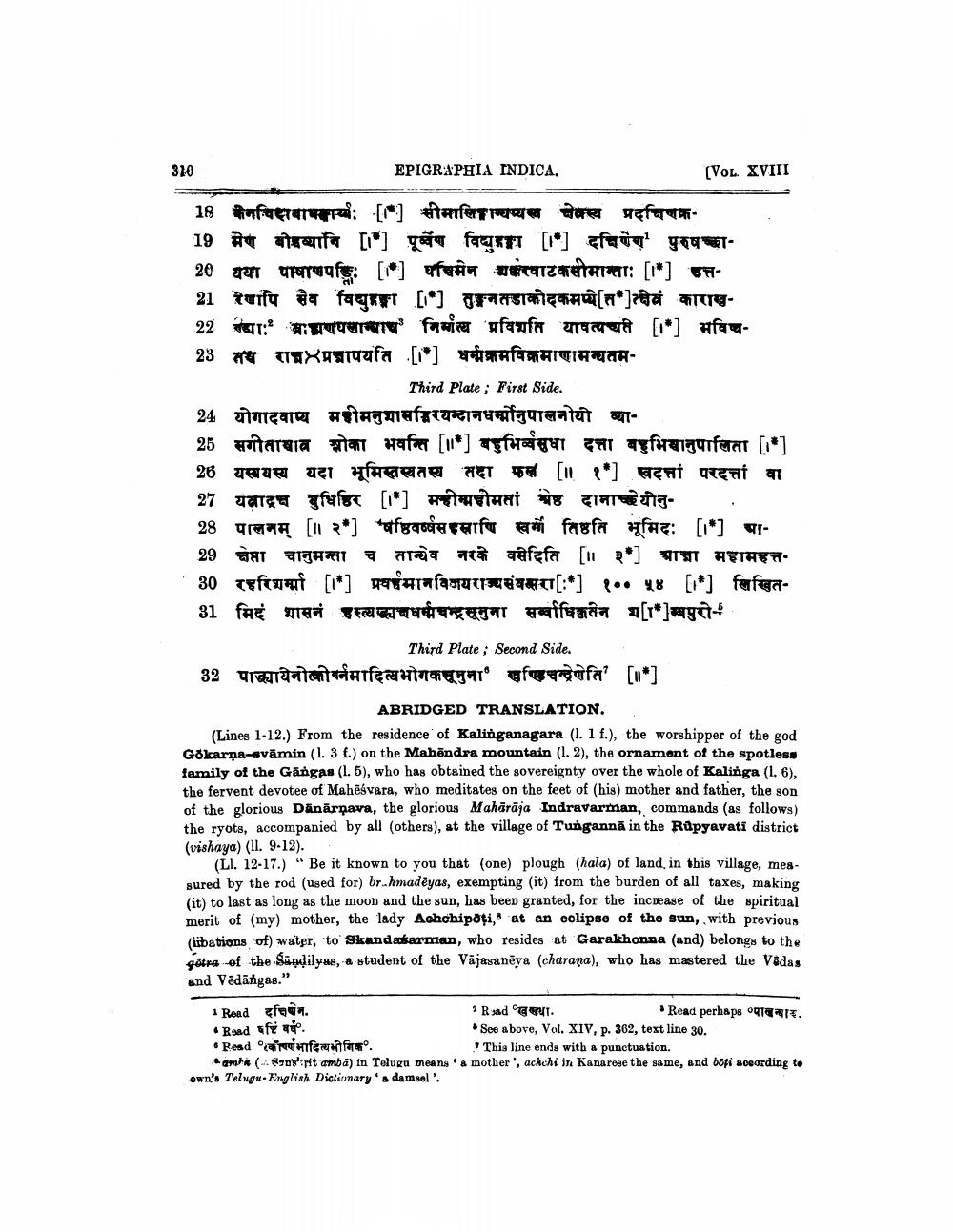________________
310
EPIGRAPHIA INDICA.
18 केनचिदाबाचार्यः [*] सीमालिकाम्यव्यस्थ चेक्स्य प्रदक्षिण19 मेच बोडव्यानि] [] पूर्वीच विद्युहा [1] दधिषेण' पुरुषच्छा20 वया पाचाचपलः [["] पश्चिमेन शरपाटकसोमान्ता: [["] - 21 रेवापि सेव विद्युङ्गा [] तुङनतडाकोदकमध्ये [स]त्वेवं कारा22 या ब्राह्मणपथान्याच निर्मात्य प्रविशति यावत्यच्यते [1] भविष्य23 तथ राम> <प्रन्नापयति [1] धक्रमविक्रमाणामन्यतम
[VOL. XVIII
Third Plate; First Side.
24 योगादवाप्य महीमनुशासरियन्दानधर्मोनुपालनोयो व्या
25 संगीताचा खोका भवन्ति [1] बहुभिर्व्वसुधा दत्ता वहभियानुपालिता [it] 26 यस्वयस्य यदा भूमिस्तस्थतस्य तदा फल [ ॥ १* ] स्वदत्तां परदत्त वा 27 यज्ञाद्रच युधिष्ठिर [1] महीमहोमतां श्रेष्ठ दामाच्छे यो
28 पालनम् [ ॥ २* ] षष्टिवर्षसहस्राणि स्वर्गे तिष्ठति भूमिदः [*] बा 29 क्षेप्ता चानुमन्ता च तान्येव नरके वसेदिति [ ॥ ३* ] आज्ञा महामहत्त 30 [ररिया [1] प्रवर्धमान विजयराज्यसंवारा [] १०.५४ [] लिखित 31 मिदं शासनं हस्त्याचधर्मा चन्द्रसूनुमा सर्वाधिकृतेन श[r*]म्बपुरो-:
Third Plate; Second Side.
39 पाढ्यायेनोको नमादित्यभोगकमुना खखिचन्द्रेयेति' [*]
ABRIDGED TRANSLATION.
(Lines 1-12.) From the residence of Kalinganagara (1.11.), the worshipper of the god Gōkarṇa-svāmin (1. 3 f.) on the Mahendra mountain (1. 2), the ornament of the spotless family of the Gāngas (1.5), who has obtained the sovereignty over the whole of Kalinga (1.6), the fervent devotee of Maheśvara, who meditates on the feet of (his) mother and father, the son of the glorious Dänarnava, the glorious Mahārāja Indravarman, commands (as follows) the ryots, accompanied by all (others), at the village of Tunganna in the Rûpyavati district (vishaya) (11. 9-12).
1 Read fen.
• Road षष्टिं वर्ष.
● Read कीर्ण भादित्यभोगिक ०.
(Ll. 12-17.) “ Be it known to you that (one) plough (hala) of land in this village, measured by the rod (used for ) brahmadeyas, exempting (it) from the burden of all taxes, making (it) to last as long as the moon and the sun, has been granted, for the increase of the spiritual merit of (my) mother, the lady Achchipati s at an eclipse of the sun, with previous (libations of) water, to Skandasarman, who resides at Garakhonna (and) belongs to the g&tra of the Sandilyas, a student of the Vajasaneya (charana), who has mastered the Vedas and Vedängas."
"
2 Road खा.
• See above, Vol. XIV, p. 362, text line 30. This line ends with a punctuation.
Mama (Sangrit amba) in Telugu means 'a mother', achchi in Kanarese the same, and böfi according to own's Telugu-English Dictionary'a damsel'.
• Read perhaps पावन्याद.




